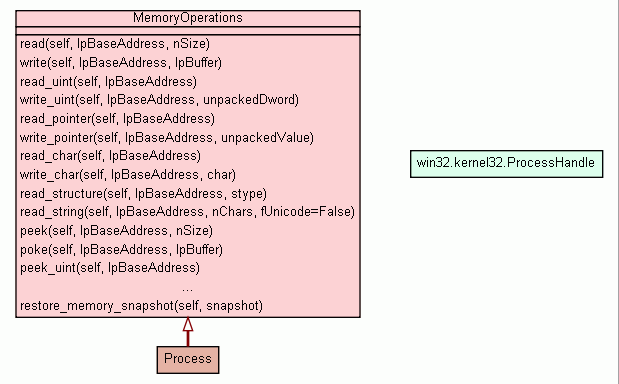Encapsulates the capabilities to manipulate the memory of a
process.
|
str, unicode
|
read_string(self,
lpBaseAddress,
nChars,
fUnicode=False)
Reads an ASCII or Unicode string from the address space of the
process. |
source code
|
|
|
dict( int → str )
|
|
|
list( win32.MemoryBasicInformation )
|
|
|
|
|
|
|
|
|
Inherited from object:
__delattr__,
__format__,
__getattribute__,
__hash__,
__init__,
__new__,
__reduce__,
__reduce_ex__,
__repr__,
__setattr__,
__sizeof__,
__str__,
__subclasshook__
|
|
int
|
malloc(self,
dwSize,
lpAddress=None)
Allocates memory into the address space of the process. |
source code
|
|
|
int
|
mprotect(self,
lpAddress,
dwSize,
flNewProtect)
Set memory protection in the address space of the process. |
source code
|
|
|
win32.MemoryBasicInformation
|
mquery(self,
lpAddress)
Query memory information from the address space of the process. |
source code
|
|
|
bool
|
free(self,
lpAddress,
dwSize=0)
Frees memory from the address space of the process. |
source code
|
|
|
bool
|
|
|
bool
|
|
|
bool
|
|
|
bool
|
|
|
bool
|
|
|
bool
|
|
|
bool
|
|
|
bool
|
|
|
bool
|
|
|
bool
|
|
|
bool
|
|
|
list( win32.MemoryBasicInformation )
|
|
|
str
|
read(self,
lpBaseAddress,
nSize)
Reads from the memory of the process. |
source code
|
|
|
int
|
read_uint(self,
lpBaseAddress)
Reads a single unsigned integer from the memory of the process. |
source code
|
|
|
int
|
|
|
int
|
|
|
int
|
|
|
str
|
peek(self,
lpBaseAddress,
nSize)
Reads the memory of the process. |
source code
|
|
|
int
|
peek_uint(self,
lpBaseAddress)
Reads a single unsigned integer from the memory of the process. |
source code
|
|
|
int
|
|
|
int
|
|
|
str, unicode
|
peek_string(self,
lpBaseAddress,
fUnicode=False,
dwMaxSize=4096)
Tries to read an ASCII or Unicode string from the address space of
the process. |
source code
|
|
|
|
write(self,
lpBaseAddress,
lpBuffer)
Writes to the memory of the process. |
source code
|
|
|
|
write_uint(self,
lpBaseAddress,
unpackedDword)
Writes a single unsigned integer to the memory of the process. |
source code
|
|
|
|
write_pointer(self,
lpBaseAddress,
unpackedValue)
Writes a single pointer value to the memory of the process. |
source code
|
|
|
|
write_char(self,
lpBaseAddress,
char)
Writes a single character to the memory of the process. |
source code
|
|
|
int
|
poke(self,
lpBaseAddress,
lpBuffer)
Writes to the memory of the process. |
source code
|
|
|
int
|
poke_uint(self,
lpBaseAddress,
unpackedDword)
Writes a single unsigned integer to the memory of the process. |
source code
|
|
|
int
|
poke_pointer(self,
lpBaseAddress,
unpackedValue)
Writes a single pointer value to the memory of the process. |
source code
|
|
|
int
|
poke_char(self,
lpBaseAddress,
char)
Writes a single character to the memory of the process. |
source code
|
|

